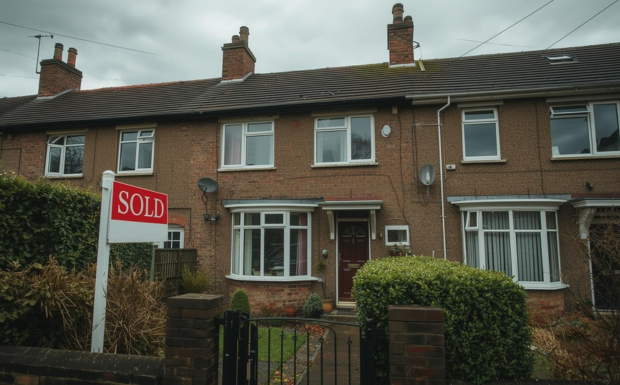The UK property market has shown signs of resilience this autumn but remains too subdued to deliver its usual seasonal bounce according to new data from Rightmove.
The average asking price for homes coming to market rose by just 0.3% (£1,165) in October to £371,422, well below the 10-year October average increase of 1.1%.
The muted rise, Rightmove said, reflects a decade-high number of homes now for sale, which has diluted sellers’ pricing power and kept activity in check.

Colleen Babcock, property expert at Rightmove, said: “Despite the overall resilience of the 2025 housing market, we’ve not got enough pent-up momentum or recent positive sentiment to spur the usual autumn bounce in property prices.
“We’re experiencing a decade-high level of property choice for buyers, which means that sellers who are serious about selling have had to acknowledge their limited pricing power and moderate their price expectations.”
BUDGET WOES
And she added: “In addition, speculation that the Budget may increase the cost of buying or owning a property at the higher end of the market, has given some movers, particularly in the south of England, a reason to wait and see what’s announced in the Budget.”
While both new buyer enquiries and new listings in September were 5% lower year-on-year, that reflects comparison with an unusually strong market in autumn 2024, when the first Bank Rate cut in four years boosted sentiment.
Over the course of 2025 so far, the picture has been more encouraging: buyer demand is up 2%, new listings are 5% higher, and agreed sales have also risen 5% compared with the same period last year.
PRICE SENSITIVE
Even so, Rightmove said this is a “very price-sensitive market”, where correct pricing is vital.
Homes that receive an enquiry on the first day of marketing are 22% more likely to secure a buyer than those that take over two weeks to attract interest.
The subdued monthly rise means national prices remain fractionally lower than a year ago, with a -0.1% annual dip.
Declines in London and the south of England, where higher stamp duty rates and increased stock have tempered demand, have dragged the national average into negative territory.
Prices in London are now 1.4% lower than a year ago, while all other regions – including Scotland, Wales, and the Midlands – have recorded annual growth of at least 1%.
STABLE RATES

Tom Bill, head of UK residential research at Knight Frank, said: “Transaction numbers over the last six months have been supported by stable mortgage rates and softer prices as sellers come to terms with the fact that high levels of supply mean it is a buyer’s market.
“However, demand is wavering for the second successive year as the autumn market gets underway, as speculation over the Budget becomes a prolonged and frustrating game of ‘guess the tax rise’.”
QUIET MARKET

Matt Smith, Rightmove’s mortgage expert, said lenders were largely on pause ahead of November’s fiscal statement: “Mortgage rates have plateaued over the last month, with some average rates rising and others falling, as lenders hit the pause button leading up to the Budget.
“The cost of financing mortgages has come down again, so we’re likely to start seeing some very gradual drops in average rates soon.
“However, until the Budget at the end of November, we’re likely to see a very quiet market with few shifts in rates, as lenders wait to see how they may be affected by any policy announcements.
“Average mortgage rates, particularly 2-year fixed rates, are still lower than they were a year ago. Combined with flat house prices and improved lending criteria, many home-movers may find their affordability significantly improved compared with last year.”
CAPITAL DRAIN
In London, the capital’s prime market continues to lag behind the regions, hindered by a mix of high borrowing costs, tax uncertainty and weaker international demand.

Marc von Grundherr, director of Benham and Reeves, said: “Whilst there is certainly plenty of initial interest in London, we’re not seeing as many buyers committing, particularly when it comes to international enquiries.
“Mortgage rates have been largely trending downwards since the base rate began to stabilise and fall, but stubbornly high inflation continues to delay the pace of cuts that many had hoped for by now.
“This has left some buyers in a holding pattern, waiting for clearer signs of sustained affordability before committing.
“A great deal of the current hesitation can also be attributed to the upcoming Autumn Budget, with many buyers preferring to wait for clarity on taxation and wider economic policy before acting. Once this uncertainty has passed, we expect the market to gather pace.
“London may be trailing the rest of the country for now, but history shows it tends to outperform once momentum builds, and we anticipate that pattern will return as confidence strengthens.”
HOUSING TAX REFORMS
As speculation mounts over potential housing tax reforms in the Budget, Rightmove has reiterated its support for policies that would improve market fluidity.
Babcock added: “It’s encouraging that housing continues to be a political priority with some radical changes being suggested.
“Abolishing stamp duty would remove one of the biggest barriers to movement.”
“We’re all for policies which would speed up the home buying and selling process and make it easier for all involved, and we’re looking forward to helping the government with our twenty-five years of housing market data.
“Rightmove has been calling for stamp duty reform for some time now, and we believe that abolishing it completely would remove one of the biggest barriers to movement.
“We hope the Government considers how they could improve it in November’s Budget. Increasing the thresholds would be a help, but going further would be a huge step forward.”
POSITIVE SIGNS

That call for reform was echoed by Nathan Emerson, chief executive of Propertymark, who said the housing market was showing “positive signs” despite softer month-on-month activity.
“Although there has been a softening of activity year-on-year, it is encouraging to see that the UK’s housing market continues to adapt to economic pressures,” Emerson said.
“While year-to-date figures show positive signs, including a rise in buyer demand and sales agreed, the month-on-month slowdown reflects a market shaped by caution, price sensitivity, and political uncertainty ahead of the Autumn Budget.
“Affordability challenges, high property choice, and the impact of recent stamp duty changes are clearly weighing on the confidence of buyers and sellers alike, particularly in the South of England.
“Our member agents are reporting similar trends on the ground, with committed buyers and sellers having to act decisively and price competitively to achieve results.
“Propertymark supports reforms that will streamline the home buying and selling process and improve market mobility.
“However, more needs to be done to ease transactional costs and boost supply, particularly in regions hardest hit by current property tax policy.
“We hope the UK Government uses the upcoming Budget to deliver meaningful support for the sector, including a full review of stamp duty, to help unlock movement across all parts of the market.”



